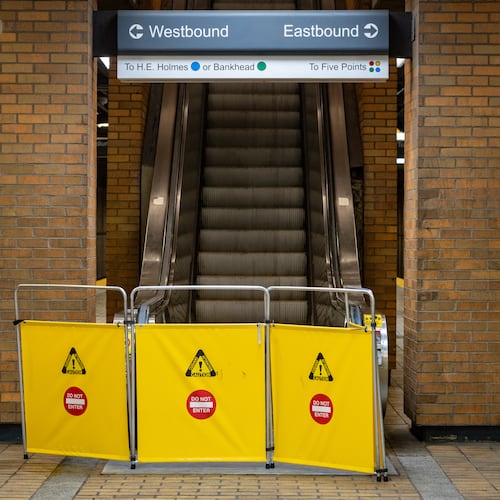The Gwinnett County Board of Commissioners sent a question Tuesday to the Nov. 5 ballot asking residents, for the third time in five years, to approve a penny sales tax for transit expansion.
The five-member board, comprised of four Democrats and one Republican, last year unanimously approved the plan. But the lone Republican, Matthew Holtkamp, voted Tuesday against sending it to the ballot, citing revised growth projections that estimate the county’s population will increase by 200,000 rather than 500,000 over the next 25 years.
Holtkamp asked to create a new transit plan using the revised estimates and proposed a half-penny sales tax that would fund microtransit and airport shuttles. “What we’ll end up with is a weight around our residents’ necks for the next 18 years,” Holtkamp said.
Gwinnett County’s growth over the past few decades has come with notorious traffic. The county hit a milestone 1 million residents in the past year, Transportation Director Lewis Cooksey said.
Voters in 2019 and 2020 rejected penny sales taxes for transit expansion, but those plans would have expanded MARTA into Gwinnett County and included heavy rail. Gwinnettians also rejected MARTA in 1990 and 1971.
Unlike those plans, the newest proposal does not involve the county joining MARTA. The sales tax would provide the majority of the funding for a $17 billion transit expansion plan that includes countywide microtransit and expanded bus routes. There would be no heavy rail.
The sales tax would take effect April 1, 2025 and last 30 years. It would raise about $12.4 billion, according to county estimates. The remaining funding would come from federal grants and fares.
The transit expansion would also include high-frequency buses, a bus rapid transit line from Doraville to Lawrenceville and express routes to Hartsfield-Jackson International Airport from the Mall of Georgia and downtown Snellville. All transit services would operate on Sundays for the first time. The sales tax would also fund new transfer facilities with real-time route information and bathrooms.
Gwinnett County would be split into 27 microtransit “zones,” two of which are already in operation in the Lawrenceville and Snellville areas for $3 per ride. Residents could use an app to order a van to their door that would take them anywhere in the zone.
Gwinnett officials have said the transit expansion plan allows residents to get anywhere in the county without a car. The board’s Democrats said the plan is still needed despite the lowered growth projections.
“Traffic and mobility is a problem now for our existing residents,” District 2 Commissioner Ben Ku said. “This is a need that we have now.”
Transit in Gwinnett now is mostly funded by property taxes. The sales tax would shift the burden from property owners to everyone who shops in Gwinnett, including visitors and tourists, the Democrats said.
Several community leaders, including Gwinnett Chamber President Nick Masino, spoke in favor of the plan.
“Gwinnett County has world-class parks and rec, world-class operations, world-class schools,” Masino said. “We need the next thing.”
Joe Newton, a vocal opponent of the last two transit expansion plans, said the plan would crowd the less developed roads of northern and eastern Gwinnett with buses.
“This plan is irresponsible,” he said. “You ought to be ashamed to put something like this in front of the public.”
Universal microtransit in Gwinnett County would cost about $6 billion over 30 years, according to county documents. Reconfiguring and expanding the county’s regular bus routes would cost about $3.5 billion. The bus rapid transit line would cost another $3 billion, but the county is anticipating federal funding for it, documents show.
The question on the ballot will read: “Shall a special one (1%) percent sales and use tax be imposed in the special district consisting of Gwinnett County for a period of time not to exceed thirty (30) years and for the raising of funds for transit projects?”
About the Author
Keep Reading
The Latest
Featured


